When it comes to HVAC tips for homebuyers and sellers, there’s a lot to keep in mind. Your HVAC system is crucial for home comfort and significantly affects utility expenses and property value. Approximately 78% of homebuyers consider HVAC systems a critical factor in their purchase decision. When buying a new home, it is important to carefully inspect the heating and cooling system and ask about its age, service history, capacity, and efficiency rating. Discuss and agree on the costs for any needed repairs or replacements beforehand. If you’re selling your home, make sure your HVAC system is evaluated and maintained, inform potential buyers of any problems you know of, and think about providing warranty coverage.
When buying or selling a home, knowing the HVAC system’s condition and how to maintain it is essential. Here are some top HVAC tips for both homebuyers and sellers:
Tips For Buyers
Check the HVAC System Before Purchasing
Checking the heating and cooling system is one of the more significant things you can do when buying a house. An experienced HVAC inspector can assess the system’s state, address any issues, and project any potential expenses. It is best practice to hire an inspector who is not employed or associated with the realtor.
The inspector will evaluate the following: the age and state of the equipment, the system’s efficiency, check the ductwork for leaks and damage, the levels of refrigerant, and the electrical wiring and connections. The inspector will deliver a report detailing the findings, which can be utilized to bargain over the home’s cost or ask the seller to make appropriate repairs.
Inquire About the System’s Age and Maintenance History
An older HVAC system is more likely to require repairs or replacements. A critical factor to consider is whether the system has been consistently maintained.
It is important to inquire about this information from the seller:
- The date of installation
- The specific make and model of HVAC system
- Appropriate service records or contracts
If the seller cannot provide these details, you can still locate them. It may be possible to find the history that reveals the installation date and make and model of the system, most notably from a sticker. If this isn’t available, you can contact the equipment manufacturer to check for any maintenance records.
Take into Account the System’s Size and Energy Efficiency
Your HVAC system should be appropriately sized for your house. A system too large can consume excess energy, while one too small cannot cool your home appropriately. You will need to know the exact size and layout of your home to decide the ideal HVAC system size for you.
Homes with efficient HVAC systems can sell for up to 10% more than those without. Another important aspect to consider when determining the ideal system is its energy efficiency. An energy-efficient system can lower your energy costs. Look for a system with a decent SEER rating (Seasonal Energy Efficiency Ratio). It is best to find an air conditioning system with a high SEER rating.
Negotiate Repair and Replacement Costs
If any HVAC repairs or replacements are needed, you may be able to bargain over the costs with the seller. This is more likely for those who found issues in the report that were not released. It is important to get all the details of the costs discussed in negotiations in writing to safeguard you from any issues arising after the sale.
Tips For Sellers
Inspect and service your HVAC system before selling your house. It is crucial to determine any problems and fix them before anyone looks at buying your house. An experienced HVAC tech can examine your HVAC and make the appropriate fixes. Another selling point of having your system inspected and fixed is that it can make your house more appealing to buyers. It is advantageous for buyers to find a home with a properly maintained HVAC system.
Disclose Problems To Potential Buyers
Buyers understandably are entitled to know about any issues with the home they plan to buy. If you don’t tell the buyers about these problems, you may be responsible for the costs of the repairs later on. Be sure to be transparent and straightforward when divulging problems to buyers, not hiding or making them seem less severe than they are.
Evaluate offering a home warranty
Providing a home warranty can make your house more attractive to buyers and allow you to secure a better deal. A warranty helps safeguard owners from unexpected and unforeseen HVAC repair expenses. Warranties usually cover the expense of repairs and replacements for devices, including your HVAC.
Stage Your Home With Running HVAC
Staging your home is a great way to show potential buyers how effectively the HVAC system works and how comfortable it makes the space. You can even leave a note to clarify how to use the system. This indicates to the potential buyer that you are making an effort in your home and are well-informed about your HVAC.
Some extra tips for staging your home with the air conditioner running include making sure you set the temperature for it to be plenty cool, cleaning the vents, changing the filter, ensuring the outside unit is free from trash and debris, and running it at least half an hour or so before buyers come. Implementing these suggestions can enhance your home’s appeal to buyers and improve your chances of receiving a favorable offer.
HVAC Inspection Checklist for Homebuyers and Sellers
When buying or selling a home, conducting a thorough HVAC inspection is crucial to avoid unexpected costs and ensure the system’s performance. Here’s a comprehensive HVAC inspection checklist to guide homeowners:
- Visual Inspection of the HVAC Unit: Check for any visible signs of wear, rust, leaks, or unusual noises. Pay close attention to the exterior condenser unit, ensuring there are no blockages like leaves, dirt, or plants that could affect airflow.
- Inspect the Ducts and Ventilation: Proper ventilation is key for optimal HVAC performance. Look for leaks, gaps, or areas in the ducts where dust, mold, or dirt could accumulate, reducing air quality. Well-maintained ducts can increase the system’s lifespan and improve energy efficiency.
- Test the Thermostat: Ensure the thermostat is in working order and is programmable for maximum energy savings. A malfunctioning thermostat can lead to inconsistent temperatures and higher energy bills. Upgrading to a smart thermostat can enhance comfort and efficiency.
- Air Filters and Coils: Check if air filters have been changed regularly. Clogged filters can cause airflow issues, strain the system, and reduce indoor air quality. The coils should also be free of dust and debris to maintain efficient heating and cooling.
- Examine Insulation and Airflow: Inspect areas like the attic, doors, and windows for drafts and poor insulation that can impact HVAC efficiency. Proper insulation helps maintain the desired temperatures and reduces the system’s workload.
- Review Maintenance History: Ask the homeowner for records of previous HVAC maintenance services and tune-ups. Regular HVAC maintenance can prevent breakdowns and extend the unit’s lifespan.
- Check Furnace and Heat Pump: If the system includes a furnace or heat pump, ensure they are functioning correctly. A professional technician can assess the condition and identify any potential issues.
- Inspect Components and Settings: Look over various parts like the air filter, fan, blower motor, and safety switches. A professional HVAC contractor can provide a detailed report on the system’s overall condition, recommending necessary repairs or replacements.
By following this inspection checklist, homebuyers and sellers can address any HVAC-related issues before they turn into costly problems, ensuring the unit is in optimal working condition.
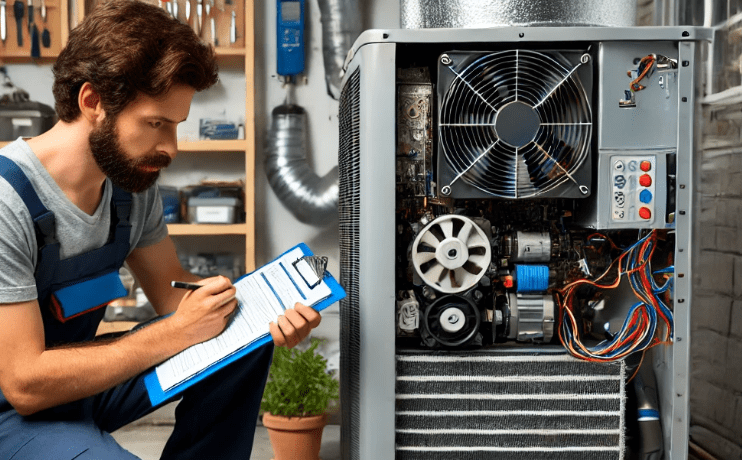
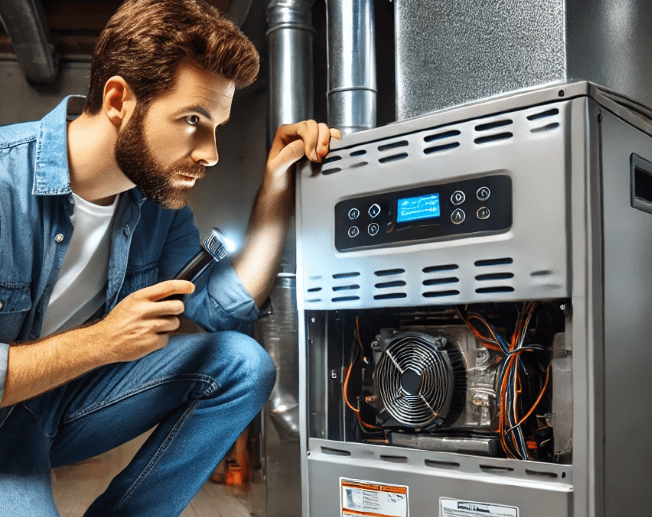

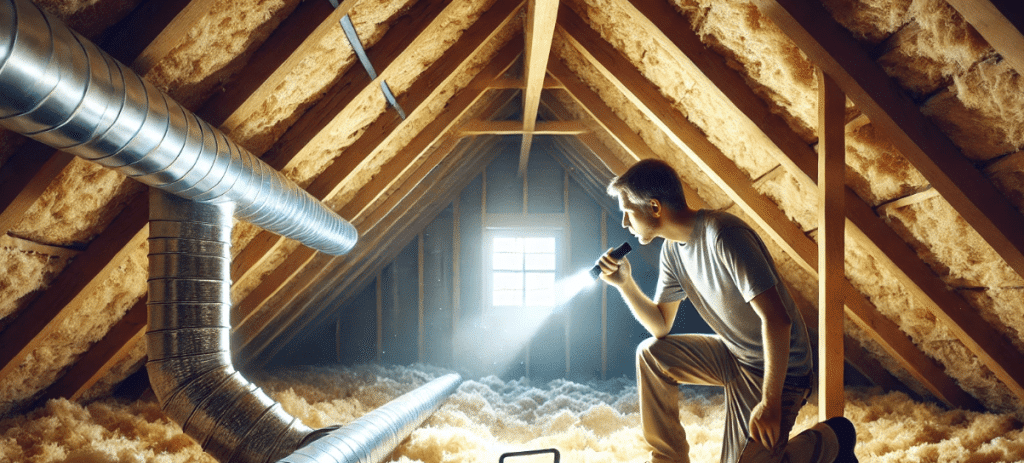
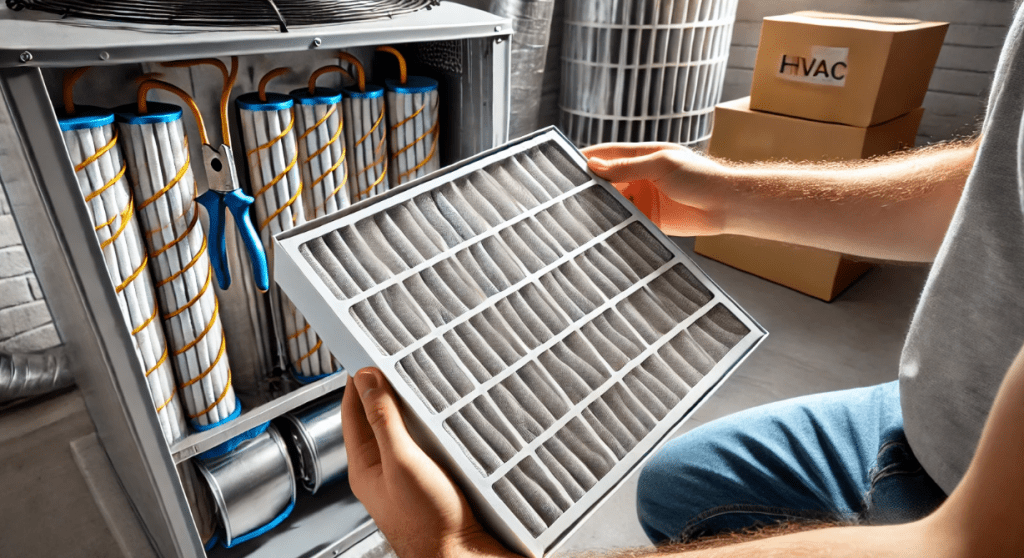
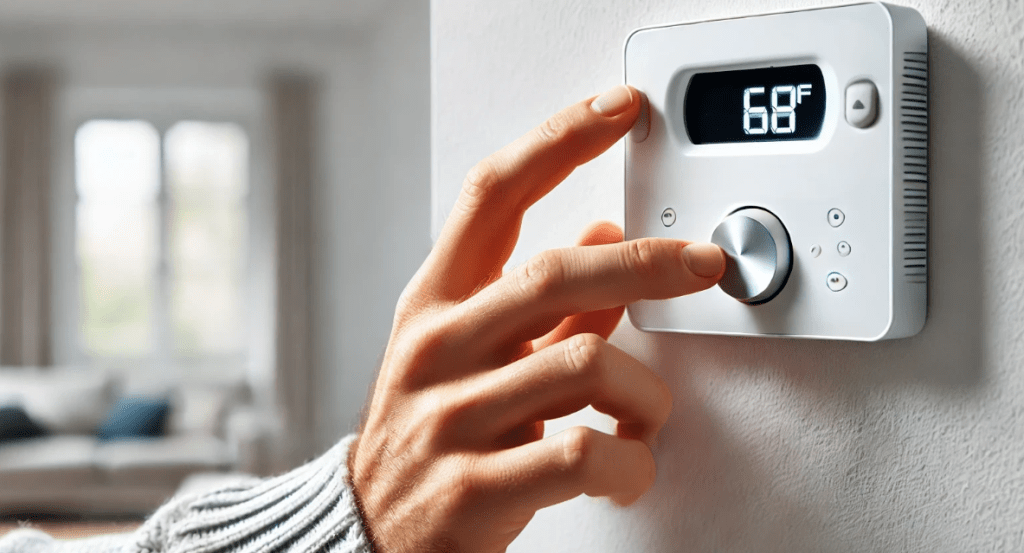
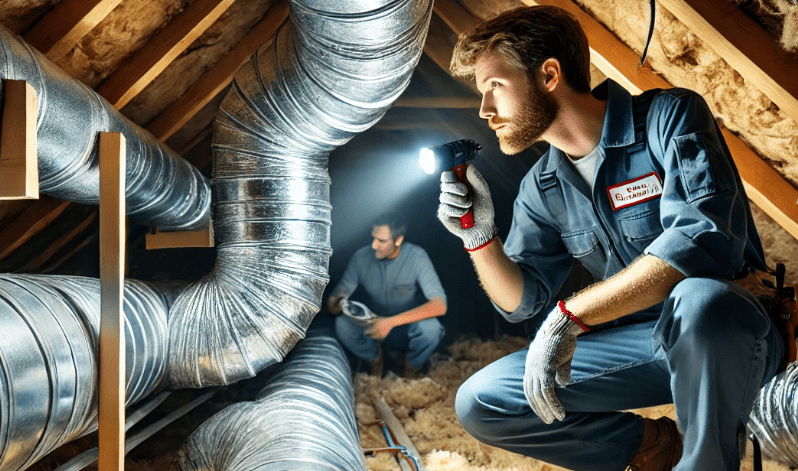
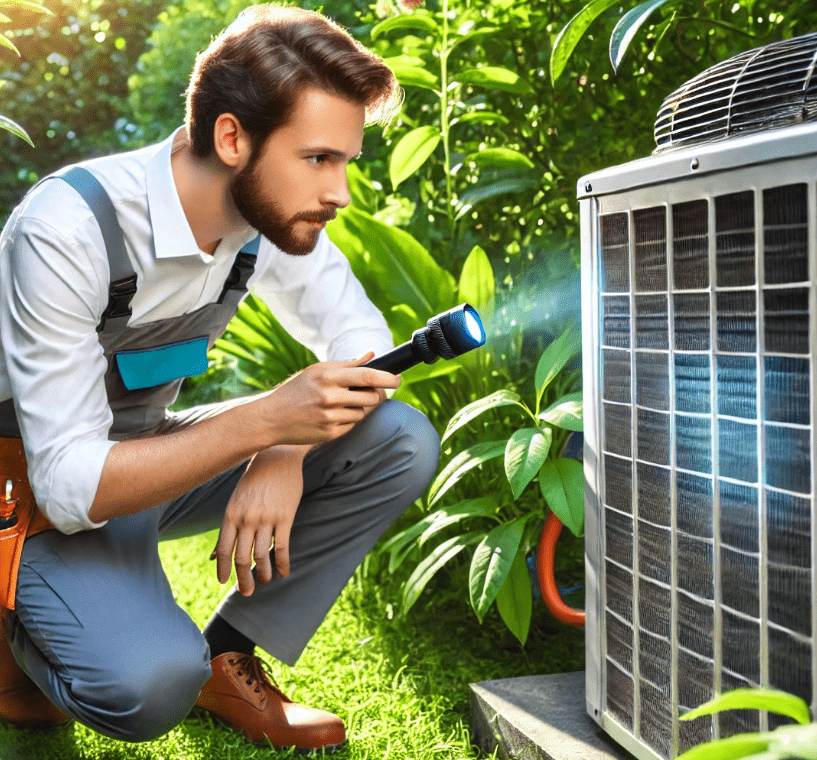
Important Questions to Ask About the HVAC System During the Home Buying Process
When purchasing a home, it’s essential to gather detailed information about the HVAC system to avoid unexpected expenses. Here are key questions every homebuyer should ask:
- What is the Age of the HVAC Unit?
- Knowing the unit’s age helps gauge its remaining lifespan. Most HVAC systems last around 10-15 years with proper maintenance, so an older system might need upgrading soon.
- Has the System Been Regularly Maintained?
- Request the HVAC maintenance records to check for consistent servicing, tune-ups, and filter changes. Regular maintenance is crucial for preventing breakdowns, increasing system performance, and improving indoor air quality.
- What is the System’s Energy Efficiency?
- Ask for details on the system’s SEER (Seasonal Energy Efficiency Ratio) rating. A higher SEER rating indicates better energy efficiency, potentially lowering future energy bills.
- Are There Any Known Issues or Repairs?
- Inquire if there have been recent repairs, unusual noises, or breakdowns. Knowing about any issues beforehand can help budget for repairs or negotiate the home price.
- When Was the Last HVAC Inspection or Tune-Up?
- Regular inspections by a professional HVAC contractor can identify and address potential problems before they become costly repairs.
- Is the System Properly Sized for the Home?
- A system that’s too large or too small can impact performance and energy usage. Confirm the HVAC unit is correctly sized for the home’s square footage and layout.
- What Kind of Air Filters Does the System Use?
- Understanding the type of air filter required and its maintenance frequency is important for ensuring optimal air quality and system performance.
- Are There Warranty Options or Service Contracts Available?
- Find out if any warranties are in place for the HVAC system or if the current homeowner has an existing maintenance service contract with a reputable HVAC company.
- How Does the System Handle Ventilation and Air Quality?
- Ask about ventilation features, dehumidifiers, or air purifiers integrated into the HVAC system. Proper ventilation and air quality controls are essential for comfort and reducing allergies.
- Are There Any Upgrades Needed for Optimal Performance?
- A professional inspection might reveal if additional upgrades, such as adding insulation, updating the thermostat, or improving ductwork, are necessary to enhance the HVAC system’s performance.
By addressing these questions during the home buying process, prospective homeowners can make informed decisions, ensuring the HVAC system aligns with their needs, budget, and comfort requirements.
Consult an Experienced HVAC Tech Before Buying or Selling
Whether you’re buying or selling a home, Larry Cook Heating and Cooling is your go-to expert for all your HVAC needs. We assist with inspecting and maintaining your HVAC system, negotiating repair or replacement costs, and staging your home with the HVAC system running to boost its appeal to buyers. Contact us today to schedule a consultation. We’ll collaborate with you to create a tailored plan that addresses your specific needs and goals. You can call Larry Cook Heating and Cooling at (316) 322-5668.




